21-01
Messiah Will Defeat Satan [21-01]

From the very beginning, God planned to send the Messiah. The first promise of the Messiah came to Adam and Eve. God promised that a descendant of Eve would be born who would crush the snake’s head. The snake who deceived Eve was Satan. The promise meant that the Messiah would defeat Satan completely.
第一个对弥赛亚到来的应许来自亚当夏娃时期。神应许从夏娃的后代中将会有人出生重击蛇的头。那欺骗夏娃的蛇就是撒旦。那个应许意味着即将来的弥赛亚将彻底击败撒旦。
Important Terms:
Translation Notes:
- From the very beginning - That is, from when the earth was first created.
- crush the snake's head - Unless the head of a venomous snake is crushed, the snake can still hurt someone. Use a word for "crush" that communicates that its head is destroyed.
- The snake…was Satan – Satan spoke to Eve in the form of a snake. This does not mean that he is a snake now. This could be translated as, "The snake…was an appearance of Satan."
- who deceived Eve - That is, "who lied to Eve." The snake lied by making Eve doubt what God had said and tricking her into disobeying God.
21-02
A Promise for the Whole World [21-02]
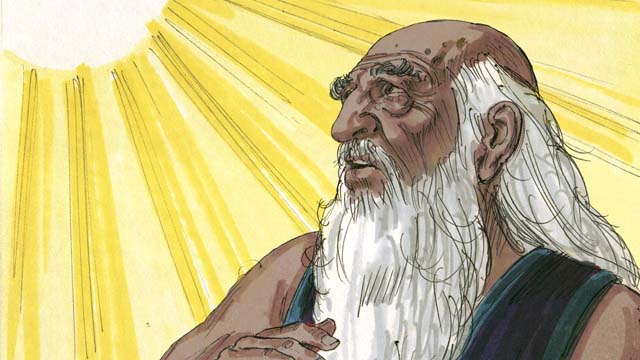
God promised Abraham that through him all people groups of the world would receive a blessing. This blessing would be fulfilled when the Messiah would come sometime in the future. He would make it possible for people from every people groups in the world to be saved.
神应许亚伯拉罕,说,通过他,所有人类都将得到祝福。这个祝福就是即将到来的弥赛亚会提供一条通往救赎的路。
Important Terms:
Translation Notes:
- through him – That is, "because of one of his descendants."
21-03
A Prophet Like Moses [21-03]
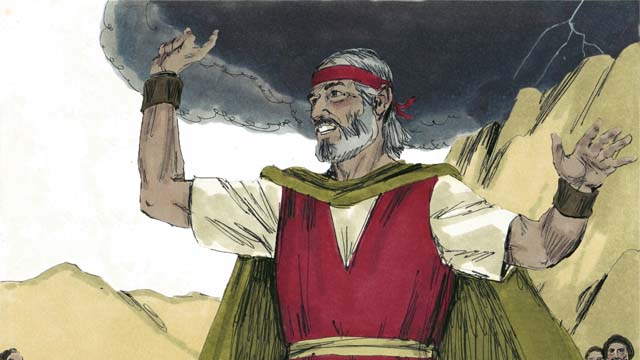
God promised Moses that in the future he would raise up another prophet like Moses. This was another promise about the Messiah who would come at some later time.
神应许摩西,他将兴起另外一个像摩西一样的先知。这是另一个对于弥赛亚的提及。
Important Terms:
Translation Notes:
- raise up another prophet like Moses - That is, "appoint another prophet like Moses" or, "cause another prophet to come who would be like Moses."
- prophet like Moses - To be like Moses, the future prophet would need to have great authority from God to lead and rescue his people.
21-04
A Descendant of David [21-04]
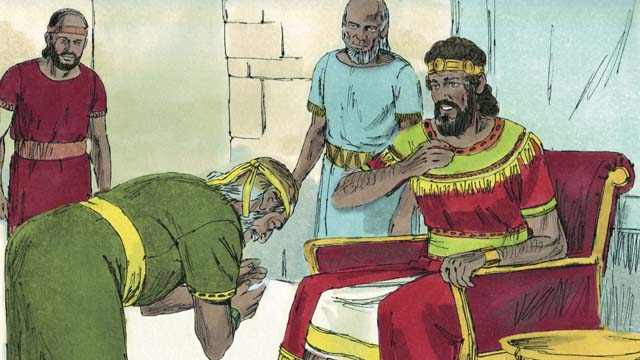
God promised King David that one of his own descendants would rule as king over God’s people forever. That meant that the Messiah would be one of David’s own descendants.
神应许大卫那弥赛亚将是出自于他的后裔。
Important Terms:
Translation Notes:
- David's own descendants - Another way to say this would be, "a direct descendant of David himself."
21-05
The New Covenant [21-05]
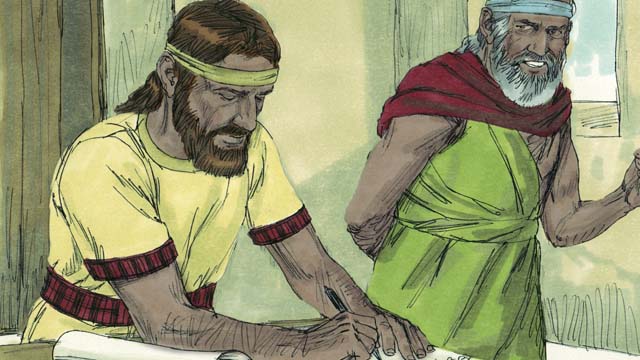
Through the prophet Jeremiah, God promised that he would make a New Covenant, but not like the covenant God made with Israel at Sinai. In the New Covenant, God would write his law on the people’s hearts, the people would know God personally, they would be his people, and God would forgive their sins. The Messiah would start the New Covenant.
通过先知耶利米,神应许他将建立一个新约,不同于和以色列的约。在新约里,神将他的律法写在人们的心里,人们会了解神,他们也会成为他的民,神也会赦免他们的罪。而弥赛亚将开启这个新约。
Important Terms:
Translation Notes:
- Through the prophet Jeremiah God promised – This could be translated as, "Through the messages that God gave to Jeremiah, God promised" or, "The prophet Jeremiah told the people God's promise."
- but not like - The New Covenant would be truly effective. People really would know God, they would truly live as his people, and He would forgive their sins completely, based on the Messiah's sacrifice of himself one time for all who believe in him.
- write his law on the people's hearts - This is a metaphor meaning, "help his people to understand his laws and to earnestly desire to obey them." If possible, keep the image of writing on their hearts, since this is in contrast with the way God had written his law on stone tablets for the Israelites. If that is not possible, you could just translate the meaning.
- be his people - This could be translated as, "be his special people" or, "be his favored people."
- start the New Covenant - That is, "be the one to cause the New Covenant to take effect" or, "bring the New Covenant to his people."
21-06
Prophet, Priest and King [21-06]
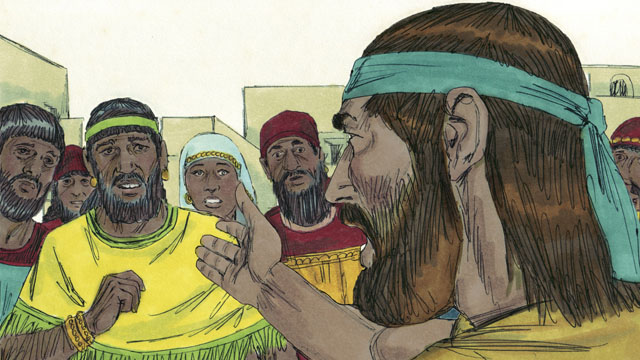
God's prophets also said that the Messiah would be a prophet, a priest, and a king. A prophet is a person who hears the words of God and then proclaims God’s words to the people. The Messiah that God promised to send would be the perfect prophet.
弥赛亚会是一个先知,祭司,国王。先知就是一个能听到神的话并想人传达神的话的人。弥赛亚是完全的先知。
Important Terms:
Translation Notes:
- perfect prophet - The Messiah would be a prophet who is perfect in obedience to God, giving every word God would speak to the people. He would present God perfectly to the people, helping them to know and understand God.
21-07
The Perfect High Priest [21-07]
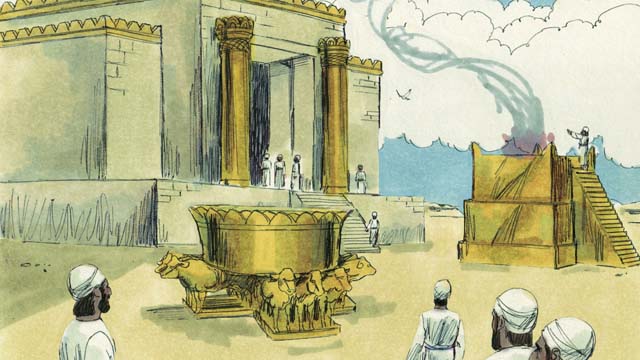
Israelite priests made sacrifices to God on behalf of the people as a substitute for the punishment for their sins. Priests also prayed to God for the people. The Messiah would be the perfect high priest who would offer himself as a perfect sacrifice to God.
祭司是在神前献祭,以脱去人们的罪的人。祭司也为人们向神祈求。弥赛亚是完全的大祭司,他把自己当成完全的祭品,献给神。
Important Terms:
Translation Notes:
- on behalf of - This may be translated as, "for the benefit of" or, "in the place of."
- as a substitute for the punishment for their sins - God allowed people to bring animals to sacrifice for their sin as a reminder of the punishment that they deserved and their dependence on God to remove their sin. God accepted these sacrifices as a temporary covering for sin and did not punish the people for it.
- perfect high priest - Unlike the other high priests, the Messiah would never sin, and he would permanently take away all the sins of the people.
- offer himself – That is, "allow himself to be killed."
- perfect sacrifice - That is, "a sacrifice that has no fault or imperfection."
21-08
Messiah Will Rule Forever [21-08]
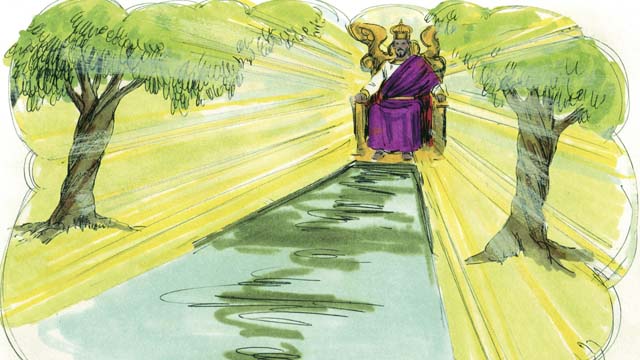
A king is someone who rules over a kingdom and judges the people. The Messiah would be the perfect king who would sit on the throne of his ancestor David. He would reign over the whole world forever, and would always judge honestly and make the right decisions.
国王是掌管一个国家并审判人民的人。弥赛亚是完全的国王。他坐在他的祖先大卫的宝座上,永远掌管全世界,实行诚实的审判并永远作正确的决定。
Important Terms:
Translation Notes:
- sit on the throne of his ancestor David - A throne is a ceremonial chair for a king or queen that represents their authority. This expression could also be translated as, "have the authority to reign as his ancestor King David did" or, "be the descendant of King David and continue his rule over God's people."
- the whole world - This could also be translated as, "everyone everywhere."
21-09
The Virgin Birth [21-09]
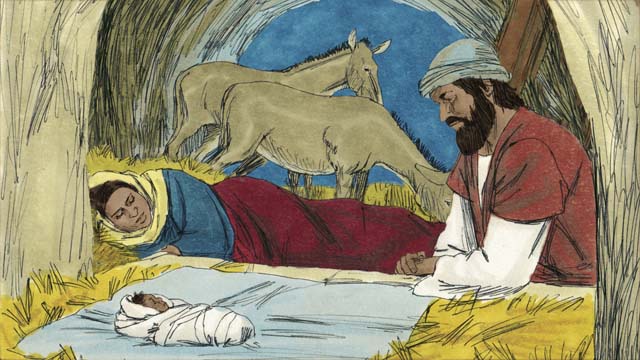
God's prophets predicted many other things about the Messiah. The prophet Malachi foretold that a great prophet would come before the Messiah came. The prophet Isaiah prophesied that the Messiah would be born from a virgin. The prophet Micah said that he would be born in the town of Bethlehem.
先知曾预言弥赛亚的诞生。玛拉基预言会有一个大先知在弥赛亚之前出现。以赛亚预言弥赛亚将从处女而生。弥迦说他会出生在伯利恒。
Important Terms:
Translation Notes:
- Malachi - Malachi was the last prophet in the Old Testament.
- foretold - This could be translated as, "predicted" or, "prophesied." It means to tell something that will happen in the future. Malachi spoke God's message to the people 400 years before the Messiah came.
- prophesied – In this context, "prophesied" has the same meaning as "foretold" and "predicted" since it means the prophet told something that would happen far in the future.
- the Messiah would be born from a virgin - Another way to say this would be, "a virgin would give birth to the Messiah."
- Micah - Micah was an Old Testament prophet of God who, like Isaiah, spoke his messages from God almost 800 years before the Messiah came.
21-10
Messiah Will Heal [21-10]
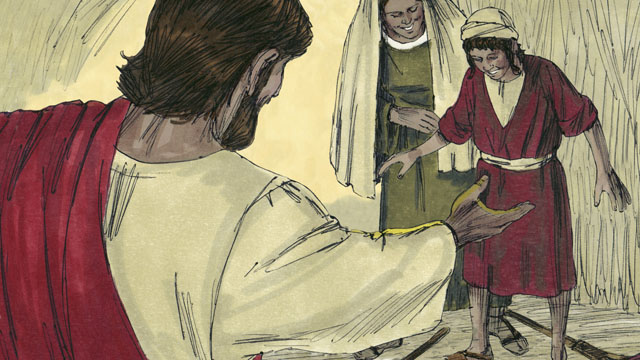
The prophet Isaiah said the Messiah would live in Galilee, comfort broken-hearted people, and proclaim freedom to captives and release to prisoners. He also predicted that the Messiah would heal sick people and those who could not hear, see, speak, or walk.
先知们也预言了弥赛亚的出生地。以赛亚说他住在加利利,安慰受伤的心,向被俘的传讲自由,向罪犯传讲释放。他也预言弥赛亚会治好生病的人,包括那些不能听见,不能看见,不能说话,不能走路的人。
Important Terms:
Translation Notes:
- broken-hearted people - This expression refers to people who are experiencing extreme sadness.
- proclaim freedom to captives - That is, "tell slaves they could be free." This could also refer to freeing people from slavery to sin.
- release to prisoners - That is, "he will set free those who have unjustly been put into prison." This could also refer to setting people free from the bondage of sin.
- could not hear, see, speak, or walk – It may be better to say, "could not hear, could not see, could not speak, or could not walk." Some languages have special words for these conditions, such as "deaf" and "blind."
21-11
Messiah Will Be Betrayed [21-11]
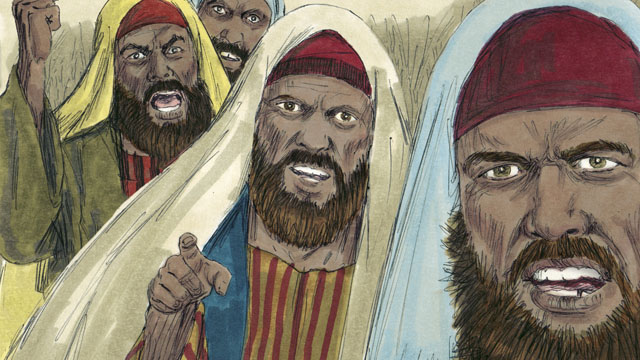
The prophet Isaiah also prophesied that the Messiah would be hated without reason and rejected. Other prophets foretold that those who killed the Messiah would gamble for his clothes and that a friend would betray him. The prophet Zechariah predicted that the friend would be paid thirty silver coins as payment for betraying the Messiah.
以赛亚预言弥赛亚会毫无原因的被恨恶被拒绝。诗篇预言人们会为弥赛亚的衣服打赌,还有他会被他的朋友背叛。(诗篇是犹太人在圣经中敬拜的歌曲。)撒加利亚预言他的朋友为了30个银钱而背叛他。
Important Terms:
Translation Notes:
- hated without reason and rejected - This could be translated as, "hated and rejected, even though he had done nothing wrong" or "…even though he was innocent."
- foretold – This means they told about things that would happen in the future. Other words that have a similar meaning are, "predicted" and "prophesied."
- gamble for his clothes - That is, "play a game of chance to determine who would win his clothes."
- Zechariah - Zechariah was an Old Testament prophet who spoke to God's people after they returned to the Promised Land from the Exile in Babylon. This was about 500 years before the Messiah came.
- thirty silver coins - At the time, each of these coins was worth the amount of money a person could earn in four days.
21-12
The Death of the Messiah [21-12]
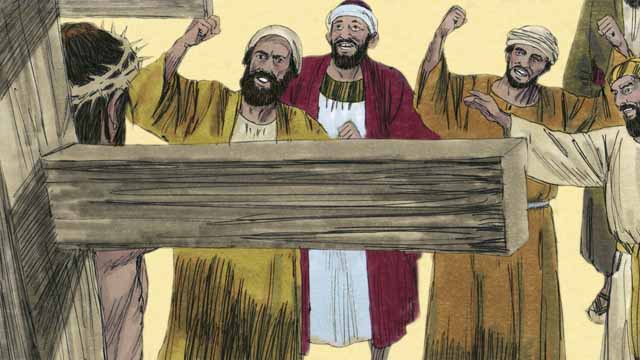
The prophets also told about how the Messiah would die. Isaiah prophesied that people would spit on, mock, and beat the Messiah. They would pierce him and he would die in great suffering and agony, even though he had not done anything wrong.
先知们也预言了弥赛亚如何死去。以赛亚预言弥赛亚被吐口水,被讥笑,被打。然后他会被刺透并被挂在树上,并死去。
Important Terms:
Translation Notes:
- pierce - That is, "stab." Sharp objects would penetrate his body as part of the punishment for people's sin.
21-13
The Messiah Will Bring Peace [21-13]
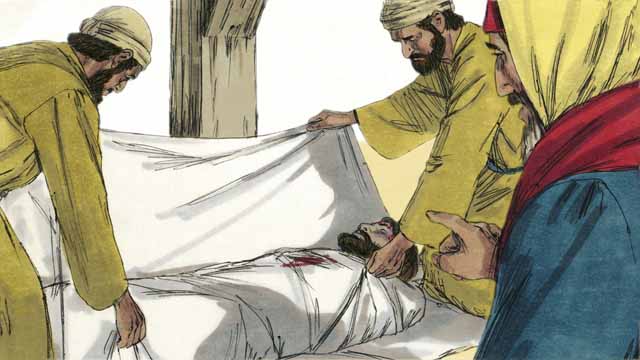
The prophets also said that the Messiah would be perfect, having no sin. He would die to receive the punishment for other people’s sin. His punishment would bring peace between God and people. For this reason, it was God's will to crush the Messiah.
弥赛亚是完全的,无罪的。他死去是为了接受其他人的罪而得到的惩罚。他的惩罚将带来人和神之间的和平。因为这个原因,神喜悦击打弥赛亚。
Important Terms:
Translation Notes:
- having no sin - This can also be translated as "he never sinned."
- receive the punishment for other people's sin - That is, "to take on himself the punishment that other people deserved" or, "to be punished in the place of other people."
- it was God's will - That is, "it fulfilled God's purpose." This phrase means that the Messiah's death was exactly what God had planned to happen in order that his sacrifice would pay for the sins of the people.
- to crush - That is, "to damage completely," "to kill" or, "to completely destroy."
21-14
Resurrection of the Messiah [21-14]
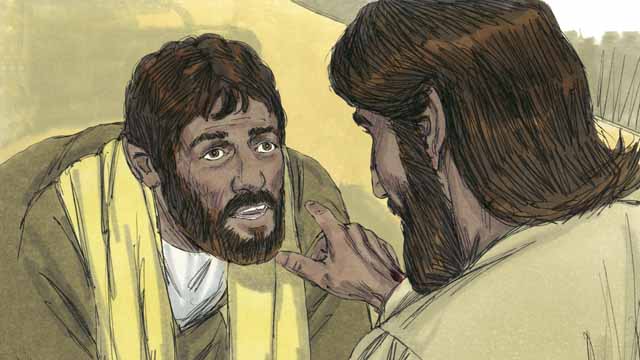
The prophets foretold that the Messiah would die and that God would also raise him from the dead. Through the Messiah’s death and resurrection, God would accomplish his plan to save sinners and start the New Covenant.
不止是弥赛亚的死,先知们预言了神将他从死里复活。通过弥赛亚的死和复活,神完成了他的救赎计划,并开始了新约。
Important Terms:
Translation Notes:
- raise him from the dead - That is, "cause him to be alive again."
- Through the Messiah's death and resurrection, God would - This could also be translated as, "God would use the Messiah's death and resurrection to" or "The Messiah's death and resurrection would be the way that God would."
- start the New Covenant – That is, "put the New Covenant into effect."
21-15
At the Perfect Time [21-15]
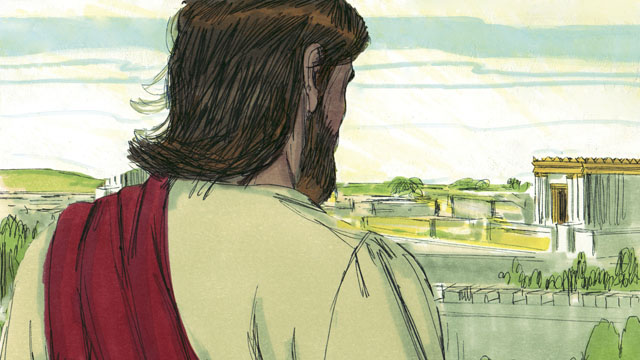
God revealed to the prophets many things about the Messiah, but the Messiah did not come during the time of any of those prophets. More than 400 years after the last of these prophecies was given, at exactly the right time, God would send the Messiah into the world.
神向先知们显示了很多关于弥赛亚的事情,但是弥赛亚仍没有来。在最后一个先知到来之后的400年,时候到了,神差遣弥赛亚到了世上。
A Bible story from: Genesis 3:15; 12:1-3; Deuteronomy 18:15; 2 Samuel 7; Jeremiah 31; Isaiah 59:16; Daniel 7; Malachi 4:5; Isaiah 7:14; Micah 5:2; Isaiah 9:1-7; 35:3-5; 61; 53; Psalm 22:18; 35:19; 69:4; 41:9; Zechariah 11:12-13; Isaiah 50:6; Psalm 16:10-11
Important Terms:
Translation Notes:
- into the world - This could be translated as, "to the people of the world." The Messiah would be sent not only to the Jews, but to all people.
- A Bible story from - These references may be slightly different in some Bible translations.
